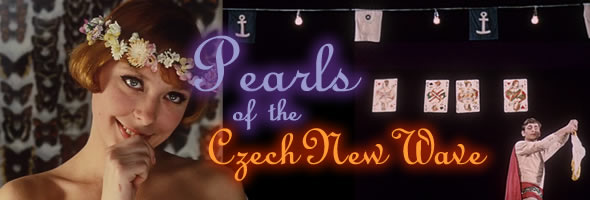PEARLS OF THE DEEP
B&W, 1966, 107m.
Directed by Jiří Menzel, Jan Nemec, Evald Schorm,Vera Chytilová, Jaromil Jires
Starring Pavla Marsálková, Ferdinand Kruta, Milos Ctrnacty, Jan Vasák, Josefa Pechlatová, Václav Zák
DAISIES
Color, 1966, 74m.
Directed by Vera Chytilová
Starring
Ivana Karbanová, Jitka Cerhová
A REPORT ON THE PARTY AND GUESTS
B&W, 1966, 71m.
Directed by Jan Nemec
Starring Ivan Vyskocil, Jan Klusák, Jiri Nemec, Pavel Bosek
RETURN OF THE PRODIGAL SON
B&W, 1967, 98m.
Directed by Evald Schorm
Starring
Jan Kacer, Jana Brejchová
CAPRICIOUS SUMMER
Color, 1968, 74m.
Directed by Jiří Menzel
Starring Rudolf Hrusínský, Vlastimil Brodský, Frantisek Rehák, Míla Myslíková
THE JOKE
B&W, 1969, 80m.
Directed by Jaromil Jires
Starring Josef Somr, Jana Dítetová, Ludek Munzar, Evald Schorm
Criterion (DVD) (US R1 NTSC)
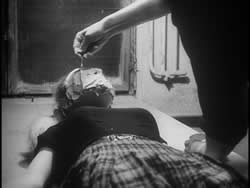 While France was undergoing the most famous "new wave of the 1960s, its close neighbors under Communist governments in
While France was undergoing the most famous "new wave of the 1960s, its close neighbors under Communist governments in 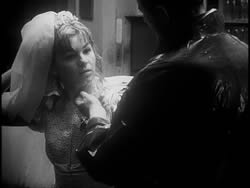 Eastern Europe were undergoing a bit of a new wave themselves. One of the most interesting movements was happening in Czechoslovakia, where directors like Jiří Menzel, Miloš Forman, Věra Chytilová, and Jan Němec found ways to tell groundbreaking stories with daring political and sexual content that often managed to slip past the censors. Even the films that were suppressed in their native country found acclaim, and their rediscovery in recent years has brought renewed fame to some amazing gems of world cinema.
Eastern Europe were undergoing a bit of a new wave themselves. One of the most interesting movements was happening in Czechoslovakia, where directors like Jiří Menzel, Miloš Forman, Věra Chytilová, and Jan Němec found ways to tell groundbreaking stories with daring political and sexual content that often managed to slip past the censors. Even the films that were suppressed in their native country found acclaim, and their rediscovery in recent years has brought renewed fame to some amazing gems of world cinema.The UK label Second Run made its name largely by uncovering some of these films while also bringing out beautiful new editions of masterpieces like Valerie and Her Week of Wonders and Daisies. Meanwhile Criterion dipped into some of the more famous films of the period like Loves of a Blonde, Closely Watched Trains, and The Shop on Main Street, but things get really interesting with their Pearls of the Czech New Wave box set under their Eclipse label.
First up and given a disc unto itself is Pearls of the Deep, a wild anthology film later released separately on Blu-ray from Second Run in 2023; click here for the review. The second disc is easily the big heavy hitter of the set, a double feature of two major titles that could have earned separate special editions unto themselves. Chytilová's Daisies can be read about in full here, and the disc does come with an equally important second feature (and my personal favorite in the entire set), A Report on the Party and Guests. Like its companion film on the disc, this was also released earlier by Second Run under its European title (The Party and the Guests) and is the best-known film by Jan Nemec. Sort of hovering the middle ground between Buñuel's The Exterminating Angel and Pasolini's Salò, it's a hilariously dark and twisted allegory about a group of friends out in the woods who set up a picnic in a clearing. Suddenly some suited interlopers show up and begin bossing them around, ordering increasingly irrational demands and setting up a desk while issuing passive-aggressive threats. Eventually they all go over a hill where a banquet table has been set up, leading to a finale in which one of the persecuted decides he's finally had enough. Like Daisies, this was banned in its home country -- but the portrayal of people as herded sheep under a mounting string of bizarre demands is easily as relevant today and would make it essential viewing regardless of national origin. The transfers for both of these films are excellent; they're easily on par with the Second Run releases and show these two landmark titles in near-mint condition.
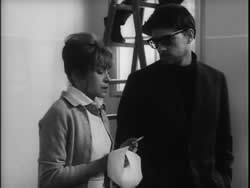 Disc three features reverts to a single feature and easily the most somber offering in the set, Return of the Prodigal Son. It's also perhaps the most obscure title in the set and will be a new experience for many as it follows a downtrodden engineer, Jan (Kacer), who tries and fails to kill himself. The film follows him on his path from a mental institution back to regular life where he goes through significant difficulties adjusting to life with his wife and young child, while his friends have their own issues to deal with as well. The premise actually sounds more depressing than the film actually is; it's a well-acted character study and a fascinating snapshot of life under imposing conditions, presumably reflecting on the government at large as an agent of suppression. The transfer is easily the weakest of the bunch in this set, which may be how the film was originally shot; it has a worn, often murky appearance, with clotted blacks and indistinct separation in brightly-lit scenes. Given the rarity of the film, it's hard to say how much of this is intentional; however,
Disc three features reverts to a single feature and easily the most somber offering in the set, Return of the Prodigal Son. It's also perhaps the most obscure title in the set and will be a new experience for many as it follows a downtrodden engineer, Jan (Kacer), who tries and fails to kill himself. The film follows him on his path from a mental institution back to regular life where he goes through significant difficulties adjusting to life with his wife and young child, while his friends have their own issues to deal with as well. The premise actually sounds more depressing than the film actually is; it's a well-acted character study and a fascinating snapshot of life under imposing conditions, presumably reflecting on the government at large as an agent of suppression. The transfer is easily the weakest of the bunch in this set, which may be how the film was originally shot; it has a worn, often murky appearance, with clotted blacks and indistinct separation in brightly-lit scenes. Given the rarity of the film, it's hard to say how much of this is intentional; however, 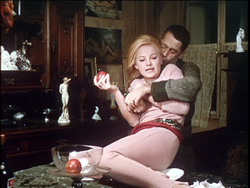 on a certain level the sludgy appearance enhances the mood of the film.
on a certain level the sludgy appearance enhances the mood of the film. Finally disc four returns to the double feature format and begins with Capricious Summer, a follow-up by Menzel to Closely Watched Trains. This one's much more colorful and oddball than expected as it charts the life changes for lakeside spa owner Antonin (The Cremator's Hrusínský) and his two friends when a low-rent circus comes to town. The main magician has a sexy assistant who offers temptation to the male residents, but it doesn't all quite go as you might expect. A sweet little pastoral portrait, this is a welcome cleanser after the more morbid previous film and features some beautiful countryside visuals along with some peculiar erotic flourishes (including the most unexpected, prolonged bit of foot f
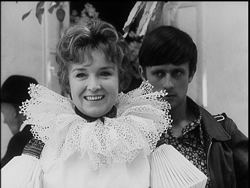 etishism this side of a Quentin Tarantino movie) and some minor, innocent nudity that barely goes up to a PG level. The colors here are maybe a bit more faded than they should be, but overall it's a satisfying and worthwhile presentation; this was actually one of Facets' better Czech releases despite its ugly burned-in subtitles, so this is a modest but welcome upgrade. Last up is its co-feature, Jaromil Jires' The Joke, which came near the movement's end. Its main claim to fame is the author of its source novel (and co-author of the screenplay), Milan Kundera, who went on to international fame with The Unbearable Lightness of Being. Of course, Jires' career includes several other notable films include the essential Valerie and Her Week of Wonders, and this also contains some of his astonishing visual sensibility. Expelled from both college and the Communist party because of a note to his girlfriend containing a touchy political joke, Ludvik (Morgiana's Somr) winds up spending time in the army, prison and enforced labor. He decides to get back at the snitch who got him into trouble by seducing his wife, but he gets a harsh lesson in the process. The film proved a little too touchy for authorities even after the Prague Spring, as the Soviet overtaking of the country by the time of its release meant the film was essentially buried for decades. It's a rigorous, wonderfully constructed film with plenty of elegant but restrained compositions, and the excellent transfer seems to do it justice. It's a marvelous little film worthy of rediscovery to be sure, and once again it's in much better shape here than its Facets predecessor (as if the better optional subs wouldn't be reason enough alone). The entire set is highly recommended, and while anyone owning the two titles available from Second Run should keep those for the more extensive extras and liner notes, this is a perfect introduction to this remarkable period in film history as well as a solid eye opener for more seasoned film buffs.
etishism this side of a Quentin Tarantino movie) and some minor, innocent nudity that barely goes up to a PG level. The colors here are maybe a bit more faded than they should be, but overall it's a satisfying and worthwhile presentation; this was actually one of Facets' better Czech releases despite its ugly burned-in subtitles, so this is a modest but welcome upgrade. Last up is its co-feature, Jaromil Jires' The Joke, which came near the movement's end. Its main claim to fame is the author of its source novel (and co-author of the screenplay), Milan Kundera, who went on to international fame with The Unbearable Lightness of Being. Of course, Jires' career includes several other notable films include the essential Valerie and Her Week of Wonders, and this also contains some of his astonishing visual sensibility. Expelled from both college and the Communist party because of a note to his girlfriend containing a touchy political joke, Ludvik (Morgiana's Somr) winds up spending time in the army, prison and enforced labor. He decides to get back at the snitch who got him into trouble by seducing his wife, but he gets a harsh lesson in the process. The film proved a little too touchy for authorities even after the Prague Spring, as the Soviet overtaking of the country by the time of its release meant the film was essentially buried for decades. It's a rigorous, wonderfully constructed film with plenty of elegant but restrained compositions, and the excellent transfer seems to do it justice. It's a marvelous little film worthy of rediscovery to be sure, and once again it's in much better shape here than its Facets predecessor (as if the better optional subs wouldn't be reason enough alone). The entire set is highly recommended, and while anyone owning the two titles available from Second Run should keep those for the more extensive extras and liner notes, this is a perfect introduction to this remarkable period in film history as well as a solid eye opener for more seasoned film buffs.
Reviewed on April 19, 2012.
![]()
